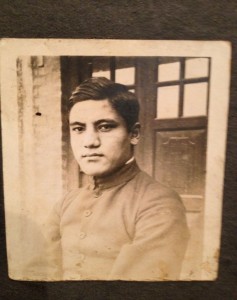Even as the sun sinks behind the buildings, life flourishes in the streets of the Hashemi district of Amman. Crowds churn as families return from Sunday mass or head off to Maghrib prayer; local eateries ready their stoves for rounds of dinner.
We watch the bustle from our place on the porch of Collateral Repair Project (CRP), an organization that aids impoverished urban refugees in Amman. In addition to my Fulbright project, I have had the opportunity to volunteer with several refugee service organizations. At CRP, Sunday is typically dedicated to administrative work and we’ve just finished outlining prospective program ideas, stepping out to catch the fading rays of sunset.
Suddenly a man approaches us, trailed by a little girl. He shuffles up the steps in a dusty coat that hangs loosely off his frame. It is clearly not tailored for him, two sizes too large. His fingertips just barely escape the sleeves as he warmly gestures hello.
They are new refugees, he says. Syrian, and he heard this place can help.
Syria. Once it used to refer to a rich cultural heritage and a host of ancient civilizations. To finely crafted armoires inlaid with seashells, to Damascus’ world-famous delicacy of Booza ice cream. Lately, it seems the only headlines mentioning ‘Syria’ are those followed by the word ‘crisis’.
It defies reason that the man is still smiling, having just fled a war-ravaged country, but somehow he is—a battered building that refuses to crumble in the storm.
My supervisor, Rami*, has the difficult task of explaining that registration for new beneficiaries isn’t until tomorrow. A closer look at the pair before him changes his mind. The man is clinging to Rami’s every word as though the sounds themselves will provide relief. His daughter’s eyes never leave him.
Going hungry is one thing. Watching your own child go hungry—while powerless to ease their suffering—is something else entirely. I cannot possibly imagine what this man feels when he looks at the family he must support.
“Why don’t I take your information?” Rami offers instead.
I turn my attention to the little girl, hoping to occupy her as they work through the details. A chance to practice colloquial Arabic, I figure. In a very businesslike manner, she informs me that her name is Huda and that she is six years old. Huda has large, inquisitive eyes, the color of freshly brewed coffee.
I resort to the nifty toolkit of conversational phrases we’ve practiced over and over and over again in class. I’m pretty sure I’ve started hearing them in my sleep.
“How are you?” I ask.
“Fine, thanks to God,” she replies, smiling.
I can barely contain my complaints (and they are loud) in a Los Angeles traffic jam and this girl, who has just left behind her only home, is fine and thankful.
She turns to face me fully, eyes wide like she’s about to reveal the wonders of the universe. In the most eloquent classical Arabic I’ve ever heard, she proclaims, “It is an honor to make your acquaintance.”
And I am floored. With a rich, literary tradition, Arabic is regarded as one of the most challenging languages to learn in the world—particularly Classical Arabic. And this six-year-old refugee girl speaks it perfectly.
Working with underserved refugees for the past few months has proven a challenging exercise in emotional resilience—but also, and more importantly, in humility. Even for those with the best of intentions, it is easy to forget that many of the individuals you serve are highly educated, versatile people who have simply found themselves in unfortunate circumstances. The relationship between the aider and the aidee risks giving way to paternalism, relegating the aidee to little more than an object of pity. It’s interactions like these, the words I exchanged with Huda, that lend perspective, that lead me to marvel at the extent of human perseverance in the face of hardship.
Watching news segments about world events like the refugee crisis is informative. Studying international affairs in the classroom is useful. Completely immersing yourself in the situation, in the context and in the language is indescribable. In addition to the chance to study the impact of war trauma on psychosocial health, the Fulbright Program has given me the unparalleled opportunity to experience history in the making, to not merely learn about other peoples and cultures but to live them. It is a dynamic, once-in-a-lifetime experience that enriches your worldview like no mere course, textbook or news soundbyte can.
“The rapprochement of peoples is only possible when differences of culture and outlook are respected and appreciated rather than feared and condemned, when the common bond of human dignity is recognized as the essential bond for a peaceful world.”
— Senator J. William Fulbright
* Names have been changed for privacy purposes
